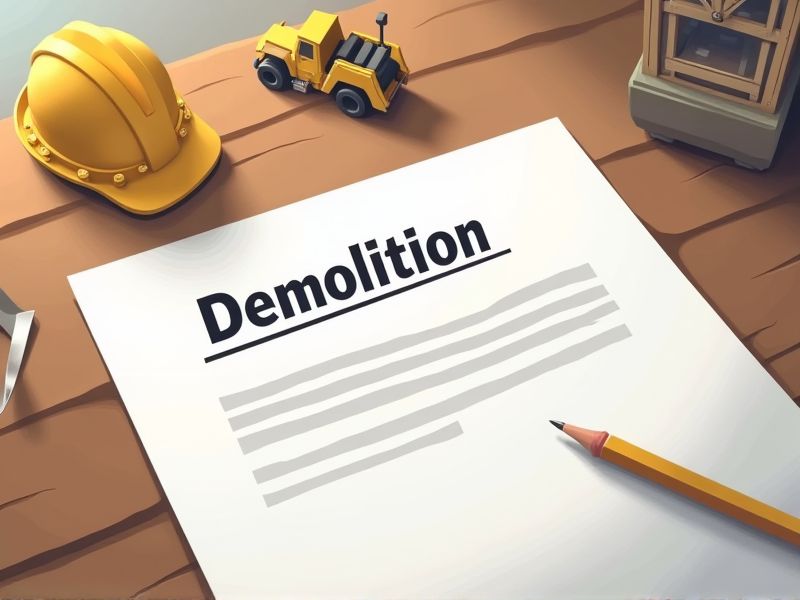
Demolition contractors face numerous safety and regulatory challenges due to the inherent risks in dismantling structures. Certifications are crucial as they ensure the contractor possesses the necessary skills to mitigate hazards and adhere to legal mandates. Acquiring these certifications also enhances reputation and client trust, as it demonstrates a commitment to industry standards. Here are some key certifications you may need as a demolition contractor.
OSHA 30-Hour Construction Safety Certification
The OSHA 30-Hour Construction Safety Certification provides demolition contractors with comprehensive safety knowledge, which helps in minimizing workplace accidents. Understanding OSHA regulations through this certification ensures compliance with safety standards, reducing the likelihood of costly fines and legal issues. Certification training educates workers on identifying potential hazards, improving the overall safety of demolition sites. Employers prefer certified workers, as it signifies a commitment to maintaining a safe working environment, potentially leading to more job opportunities in the construction industry.
OSHA 10-Hour Construction Safety Certification
Obtaining the OSHA 10-Hour Construction Safety Certification helps demolition contractors understand essential safety protocols, reducing the risk of accidents on site. The certification educates workers on recognizing and managing potential hazards, which is crucial in the high-risk demolition industry. Contractors with this certification demonstrate compliance with federal safety standards, which can be a requirement for certain projects or contracts. Training contributes to a safer work environment, potentially lowering injury-related costs and liability for employers.
Demolition Safety and Risk Management Certification
Demolition Safety and Risk Management Certification is essential for contractors to ensure compliance with regulatory standards, reducing potential legal liabilities. By obtaining this certification, a contractor demonstrates a commitment to best practices in hazard identification and accident prevention, enhancing workplace safety. The certification aids in risk mitigation by equipping contractors with the necessary skills to manage and control potential site hazards effectively. Clients often prioritize hiring certified contractors as it reflects both professionalism and the ability to execute projects safely and efficiently.
Asbestos Abatement Certification
Asbestos abatement certification is required for demolition contractors because it ensures they possess the necessary skills to handle asbestos safely, reducing health risks. Certified contractors can identify asbestos-containing materials, preventing their release during demolition. This certification ensures compliance with regulatory standards, avoiding potential legal and financial liabilities. Trained contractors maintain public health by properly managing asbestos disposal.
Lead-Based Paint Renovation, Repair, and Painting (RRP) Certification
Demolition contractors need Lead-Based Paint Renovation, Repair, and Painting (RRP) Certification to comply with EPA regulations aimed at preventing lead contamination. This certification ensures contractors have the necessary training to safely handle and dispose of lead-based paint, mitigating health risks to workers and residents. Without this certification, contractors risk facing significant fines and legal penalties, impacting their business operations. Proper certification also enhances a contractor's credibility, attracting clients who prioritize safety and environmental responsibility.
Hazardous Materials Handling Certification
Hazardous Materials Handling Certification ensures demolition contractors are equipped with the necessary knowledge to safely manage and dispose of dangerous substances like asbestos and lead, reducing health risks. Proper certification enhances compliance with federal and state regulations, avoiding legal penalties and fines. Certified contractors are trusted to protect the environment by minimizing contamination during demolition projects. This certification can also enhance a contractor's reputation and increase job opportunities in projects requiring meticulous safety standards.
Confined Space Entry and Rescue Certification
Confined Space Entry and Rescue Certification is necessary for demolition contractors because demolition often involves working in environments like tanks, sewers, or below-ground structures, which are classified as confined spaces. Confined spaces pose significant hazards, such as toxic gases, limited oxygen, and the risk of entrapment, necessitating specialized training to ensure worker safety. Certification ensures that workers are equipped to handle emergencies, minimizing potential injuries or fatalities during unexpected incidents. Regulatory bodies mandate these certifications to promote adherence to safety standards and minimize liability for contractors.
Explosives Licensing/Certification for Controlled Demolition
Explosives licensing and certification for controlled demolition is crucial to ensure safety standards are met, reducing risks to workers and the public. Proper certification guarantees that the demolition contractor understands the complex regulations and techniques necessary for effectively using explosives. Licensing ensures that only qualified professionals handle explosives, which minimizes the potential for accidental detonations. Certification in controlled demolition serves as a measure of accountability and builds trust with clients and regulatory bodies.
Fall Protection and Working at Heights Certification
Demolition contractors face increased risks of falls due to the unstable structures they deal with, making fall protection and working at heights certification essential for safety compliance. Certification ensures that contractors are trained to use the necessary safety equipment effectively, reducing the likelihood of accidents. The certification process also updates the workers on the latest safety regulations and standards, ensuring legal compliance. Insurance companies often require certification to provide coverage, affecting the contractor's ability to work on certain projects.
First Aid/CPR Certification
Demolition contractors often work in high-risk environments where accidents can occur, and first aid/CPR certification is crucial to provide immediate care and potentially save lives. Being trained in these skills enhances safety protocols, which can decrease the severity of injuries onsite. Certification also serves as a compliance measure, aligning with OSHA regulations that mandate safety preparedness in hazardous jobs. Possessing first aid knowledge promotes a culture of safety, reassuring clients and employees of the contractor's commitment to health and well-being.
Summary
When you hire a demolition contractor with certifications, you can expect increased reliability and expertise in their work. Certifications often lead to improved safety standards, reducing the likelihood of accidents on-site. Certified contractors tend to follow industry best practices, resulting in more efficient project completion. You can also anticipate higher quality compliance with environmental regulations, minimizing potential liability issues.
